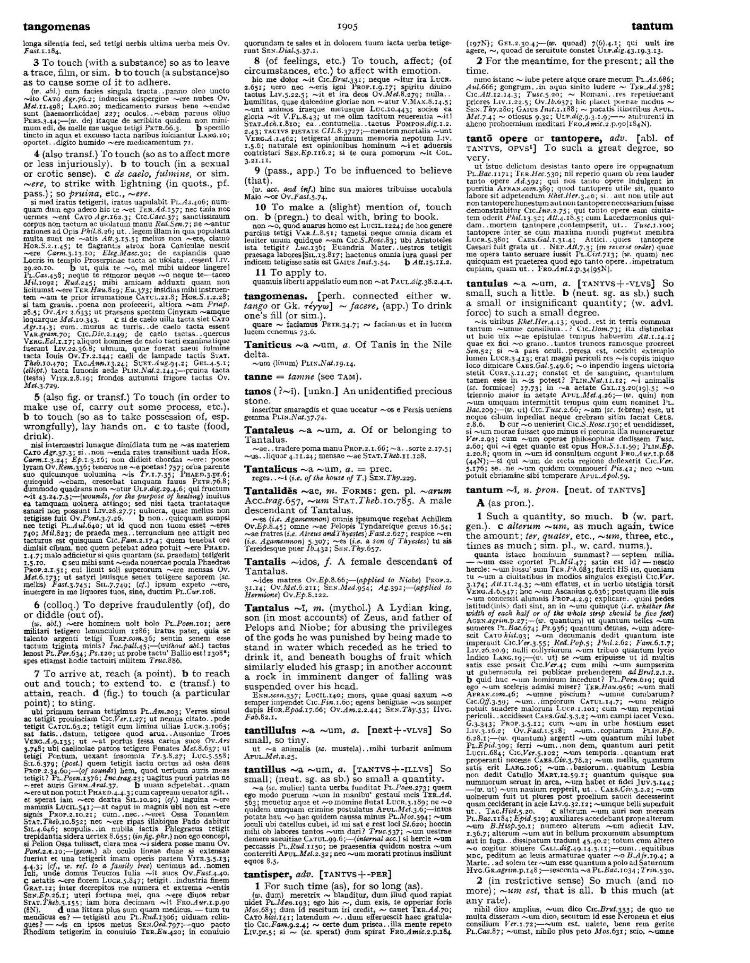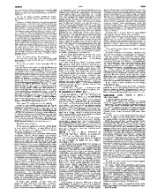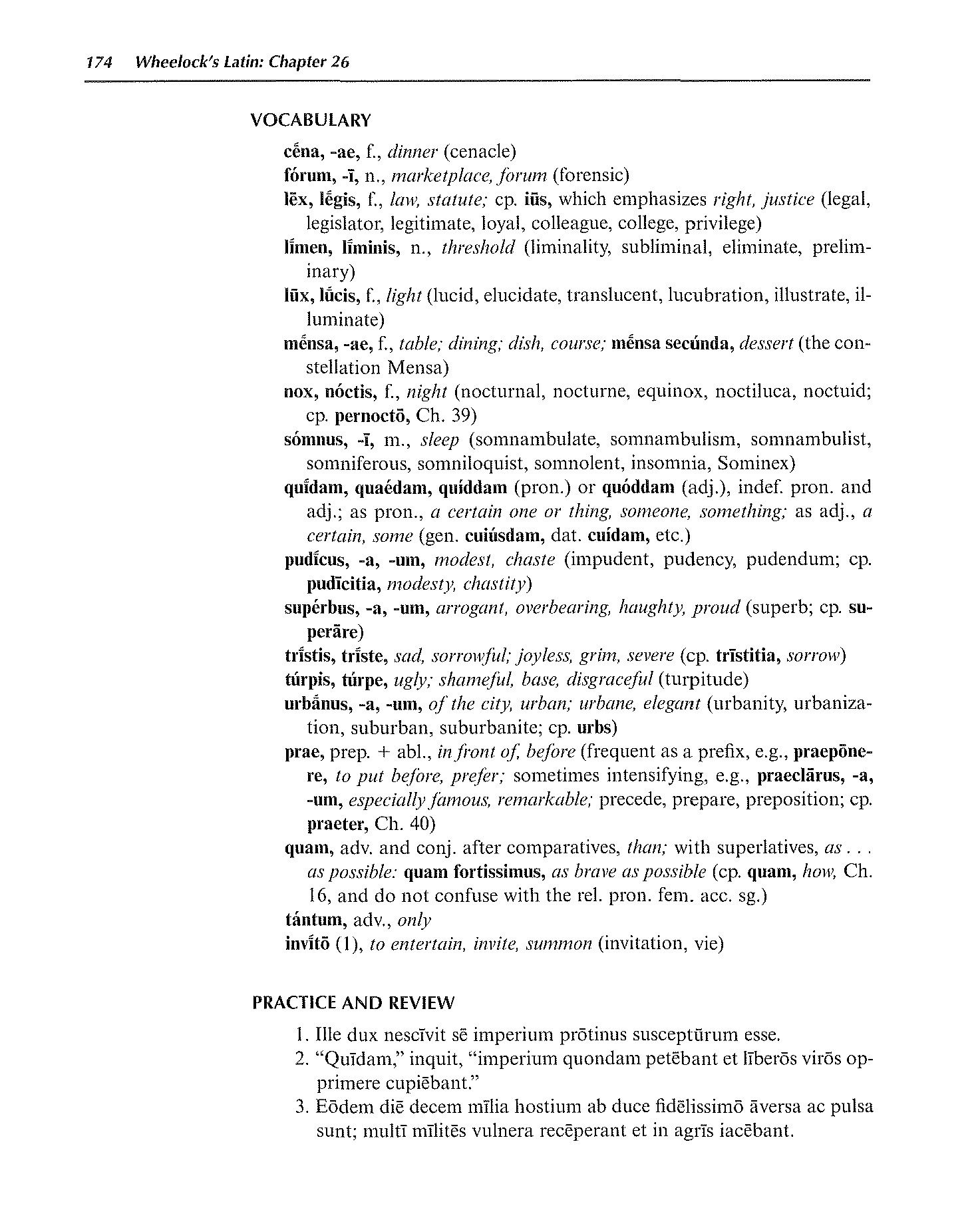
page_listing.tpl
page_subListingDetails.tpl
sub_listingDetails_style1.tpl
sub_listingDetails.title.tpl
tantum only
tantum is a Latin Adverb that primarily means only.
Definitions for tantum
Wheelock's Latin
Adverb
- 1
only
Oxford Latin Dictionary
Pronoun
- 1
Such a quantity, so much. (b) (w. part. gen.). (c) alterum ~um, as much again, twice the amount; ter, quater, etc., ~um, three. etc., times as much; sim. pl., w. card. nums.).
- 2
(in restrictive sense) So much (and no more); ~um est, that is all. (b) this much (at any rate).
Adverb
- 1
To such an extent or degree. (b) for such a time; such a distance. (c) ~um abesse ut (or ab)..ut, (in pers. or impers. const.) to be so far from (being the case) that.
- 2
Only, just, merely. (b) non ~um..Sed etiam, or sim., not only..but also. (c) (modifying a spatial or temporal interval) only just. (d) (introducing a qualification) only, but.
Sentences with tantum
Latin to English
Quis est quī tantum dolōrem ferre possit?Compare Who is there who would be able to bear such pain?
Terra nostra tantum pacem optat.Compare Our country only wishes for peace.
Non iter tantum do, sed via etiam munio, pons facio, commeatus praebeo.Compare I not only granted a passage, but I made roads also, I built bridges, I provided supplies.
Tu vero felix, Agricola, non vitae tantum claritate, sed etiam opportunitate mortis.Compare You were indeed fortunate, Agricola, not only in the splendor of your life, but also in the opportune moment of your death.
Sum enim Scipio non verus tantum virtus mirabilis, sed ars quoque quidam in ostentatio is compositus.Compare For Scipio was not only remarkabke for true virtues, but also fitted by a certain tact for the display of them.
Romani non via tantum, sed tectum etiam proximus porta occupo.Compare The Romans had occupied not only the streets, but also the houses nearest the gate.
Data sources
Notes
- Definitions
- Frederick M. Wheelock, Wheelock's Latin, 6th ed., rev. Richard A. LaFleur (New York, NY: HarperCollins Publishers, 2005): 174.
- P. G. W. Glare, Oxford Latin Dictionary, Vols. 1-8 (Oxford: Clarendon Press, 1982): 1905.
- Word frequencies
- Christopher Francese, "Latin Core Vocabulary," Dickinson College Commentaries, last modified 2014, http://dcc.dickinson.edu.
- Louis Delatte, Suzanne Govaerts, Joseph Denooz, and Etienne Evrard, Dictionnaire fréquentiel et index inverse de la langue latine [Frequency Dictionary and Inverse Index of the Latin Language] (Liège, Belgium: Laboratoire d'analyse statistique des langues anciennes de l'Université de Liège [L.A.S.L.A.], 1981): 120.
Bibliography
Allen, Joseph H. Allen and Greenough's New Latin Grammar for Schools and Colleges: Founded on Comparative Grammar. Edited by James B. Greenough, George L. Kittredge, Albert A. Howard, and Benjamin L. D'Ooge. Boston, MA: Ginn & Company, 1903.
Crystal, David. A Dictionary of Linguistics and Phonetics. 6th ed. Oxford, UK: Blackwell Publishing, 2008.
Delatte, Louis, Suzanne Govaerts, Joseph Denooz, and Etienne Evrard. Dictionnaire fréquentiel et index inverse de la langue latine [Frequency Dictionary and Inverse Index of the Latin Language]. Liège, Belgium: Laboratoire d'analyse statistique des langues anciennes de l'Université de Liège (L.A.S.L.A.), 1981.
Diederich, Paul B. The Frequency of Latin Words and Their Endings. PhD diss., Columbia University, 1939.
Francese, Christopher. "Latin Core Vocabulary." Dickinson College Commentaries. Last modified 2014. http://dcc.dickinson.edu/latin-vocabulary-list.
Gildersleeve, Basil L., and Gonzales Lodge. Gildersleeve's Latin Grammar: Third Edition, Revised, and Enlarged. 3rd ed. London, England: Macmillan and Co., 1903.
Glare, Peter G.W. Oxford Latin Dictionary. Vols. 1-8. Oxford, England: Clarendon Press, 1982.
Krüger, Bernd. "Latin Conjugation Tables." Cactus2000. Accessed May 5, 2023. https://latin.cactus2000.de/index.en.php.
Pierson, Nick. "Sound of Text." Accessed October 26, 2019. https://soundoftext.com.
Wheelock, Frederick M. Wheelock's Latin. 6th ed. Revised by Richard A. LaFleur. New York, NY: HarperCollins Publishers, 2005.
Wiktionary Contributors. "Victionarium." Wikimedia Foundation, Inc. Updated March 18, 2019. https://la.wiktionary.org/wiki/Victionarium:Pagina_prima.
Citation
Chicago (17th ed.)
Allo Contributors. "tantum (adv.) - Latin Word Definition." Allo Latin Dictionary. Last modified . Accessed January 31, 2026. http://ancientlanguages.org/latin/dictionary/tantum.
Entry created on . Last updated on .








